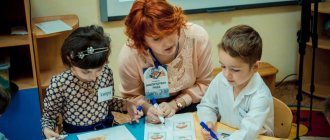Most often, healthy children pronounce their first words at about one year of age. If this does not happen, many parents begin to sound the alarm. However, experts in the field of early development have concluded that the initiation of speech is an individual process for which there is no clear age period. Studies of speech development show that the appearance of speech in a child depends both on the maturation of certain parts of the brain and on the environment in which the child grows. Knowing the characteristics of their child, parents can create a favorable environment for him and help overcome difficulties in the development of your baby's speech.
Speech development at an early age
Sometimes we mistake baby talk for “real” words. A child under one year old tries to repeat the speech of an adult in his own language, often understandable only to his mother. Already a six-month-old baby uses gestures and individual sounds to indicate his needs. Also at this age, the child learns to combine vowels and consonants when pronouncing syllables.
The process of speech development itself is not systematic in children of early and preschool age; very often one can observe leaps in speech development. All children begin to speak at different times. By the age of one year, some children can already pronounce up to 15 separate words. And according to the calculations of child psychologist S. Buller, by the age of 1.5 years, a child’s vocabulary can reach 232 words. At the same time, there are healthy children who at the age of two do not speak a word. Such “silent people” can suddenly begin to speak in whole phrases, catching up and ahead of their peers.
To get a silent child to talk and stimulate the development of his speech, you need to voice your actions, encourage dialogue with the help of questions, listen with interest and try to understand the baby’s answers. Then you will certainly hear that cherished first word.
What happens after 3 years
The child goes to kindergarten. By this point, he knows 250-700 words - a colossal number, right? A kindergartener constructs sentences of 5-8 words and completes tasks (“put this on your neck”). He also knows his name and understands short stories and fairy tales.
Then speech develops rapidly (although in everyday life we do not notice this). For example:
- 4 years. The child uses 1500-2000 words (more than some of us know from English). Uses prepositions and conjunctions, begins to pronounce hissing sounds correctly.
- 5 years. Vocabulary 2500-3000 words. Syllable rearrangements disappear from words. All parts of speech are used in sentences.
- 7 years. A preschool child uses up to 3,500 words, many of which are figurative. And he even uses fixed expressions (“without hind legs”, “by the sweat of his brow” - sometimes it’s very funny to hear).
By the preparatory group of a preschool educational institution, a preschooler develops memory, attention and logical thinking. He can himself, in a coherent speech, explain the meaning of any concept (“winter is when it’s cold and gets dark early”). The child has the prerequisites for successful schooling.
Stages of child speech development
As we have already said, the trajectories of speech development are individual for each child, and therefore psychologists and other specialists in the field of early development do not establish clear standards for speech development in children.
It is important to note that an indicator of speech development is not only the number of sounds and words that a child uses to communicate, but also his passive vocabulary, that is, those words that the child understands. The passive vocabulary is always larger than the active one, so if the child does not speak, but understands your speech, there is most likely no reason to worry.
Speech skills characteristic of the conditional norm in early and junior preschool age are presented in the table.
| Age | Speech development |
| 1-3 months | Scream. |
| 3-6 months | Humming – drawn-out sounds (“a-gu”, “a-gy”, “bu-u”, etc.). |
| 4-5 months | Squealing, laughter. Humming in various intonations. |
| 6 months | Babbling (syllables “ma”, “ba”). |
| 7-8 months | Increasing the number of pronounced sounds, onomatopoeia (“woof-woof”, “pee-pee”), understanding simple words and requests. |
| 9-11 months | Simple words (“mother”, “baba”, “give”, “na”). |
| 1–1.5 years | Simple two-word phrases (“give yum-yum”, “there’s a pussy there”). |
| 2-3 years | Phrases of 2-3 words, the appearance of question words. Naming famous colors, objects, body parts. Learning simple poems, telling short stories. |
| 34 years | Phrases of 4 or more words. A stranger can understand a child’s speech. |
If there is a strong discrepancy between the child’s speech development level and age norms, it is advisable to seek advice from a specialist (neurologist, speech therapist, psychologist) in order to exclude a delay in psycho-speech development.
Symptoms of delayed speech or mental development of a child may include the following:
- Problems with chewing and swallowing food;
- Constantly open mouth, excessive salivation;
- Refusal to communicate;
- Lack of eye contact;
- Slurred speech, “porridge in the mouth”;
- Difficulties in understanding speech (does not respond to requests);
- Inappropriate behavior.
Timely contact with specialists allows you to identify the cause of the child’s delayed speech development as early as possible and develop an individual plan for correctional and developmental classes.
The importance of children's language development
In young children, language development coincides with the development of thought. Cognitive skills are next to language skills, so a child who puts effort into language development will also be diligent in studying other academic subjects and areas of development.
Language is communication, both expressive and receptive. Expressive language is spoken or communicated using sign language. Receptive language is speech or information that is conveyed or understood.
The influence of speech on writing and reading
Language and literacy (writing and reading) develop together. Early language and literacy skills develop several years before a child starts school and needs social interaction and an environment that engages the child. Previously, experts believed that a child's development of language skills occurred at random, and then only literacy was acquired. However, we now accept that these skills are interrelated and that the child does not develop them in isolation from others.
The influence of speech on school success
The development of a child’s speech directly affects his success in school. This is one of the best ways to predict what he will do in school. When a child has outstanding language skills, it affects all other academic subjects. Essentially, reading has a lot to do with print, and a child is able to perceive these written symbols and attach meaning to them due to early language development.
The influence of speech on emotional development
Language development is also important in a child's ability to express and communicate emotions. It starts with the babbling and cooing of the baby and the bond that is built between the baby and his caregivers. Early speech consists more of cries expressing needs and gradually gives way to more verbalization. When a child's language development improves, there are usually fewer emotional outbursts and tantrums. A child who can express emotions through words will have an easier time coping with school and academic tasks and will be more successful in the school social environment.
First word
What should a baby's first word be? Early development specialists believe that it does not necessarily have to be familiar and familiar to us. Experts tend to consider any recognizable set of sounds that denote a person, object or action (for example, “baka” instead of “dog”, “ka” instead of “porridge”) as a peculiar word.
Usually children say their first word at the age of 8-9 months. Most often these are onomatopoeias or words of two repeated syllables.
How to understand that a child said exactly a word, and not just a set of sounds? If the child’s statements are repeated under the same circumstances, even if you cannot understand them, rest assured that your baby said a word, his speech apparatus is simply not yet developed enough to pronounce this word legibly. To prevent your child’s speech development from slowing down, you should not speak to your baby in his “baby” language. If your child says “beep beep” while pointing at a car, say, “That’s right, it’s a car.” While walking in the yard, ask your child to show you the car. And to translate the word “car” from a child’s passive vocabulary to an active one, point to the car and ask: “What is that?” Then your baby will certainly learn a new word and learn to pronounce it correctly.
There is a myth that a child’s first word must be the word “mother.” Indeed, some children say “mom” as early as 4-5 months. Also, even before one year old, children can say “Lala”, “Baba”, etc. These are all easy-to-pronounce words that are formed from the repeated babble of a child. The words that are easy to pronounce come first.
Types of speech
Speech can be active or passive:
- Active - the one that the baby uses. The child knows the words he has learned, can confidently pronounce them, and construct sentences with their help.
- Passive is the one that the child understands, but for certain reasons does not pronounce. For example, he may know the word “TV”, but not say it because it is difficult for him.
It is very important to develop both active and passive speech of a child.
First phrases
An important stage in speech development is the acquisition of phrasal speech in preschool age. By the age of 1.5–2 years, simple two-word phrases usually appear in speech. The vocabulary is actively increasing, verbs, prepositions, and adverbs are being used. At 2-3 years old, children begin to use adjectives. The age of 3-5 years is often called the age of “why”. During this period, children are interested in everything, eagerly learn about the world around them and, accordingly, ask adults many questions.
If at this age the child does not have phrasal speech, you should consult a specialist. Developmental activities will help fill in the gaps and lay the foundation for the further development of your baby’s speech.
To develop your child’s phrasal speech, you can do the following:
- Read books to your child that are appropriate for his age;
- Look at the pictures;
- Listen to music with your child, sing songs, dance;
- Answer the child’s questions and support his research interest;
- Provide the child with new impressions, discuss what he sees;
- Monitor the purity of your own speech;
- Encourage communication with children.
There are also a number of games and exercises that contribute to the development of a child’s speech. These include:
- Games to develop fine motor skills;
- Articulation gymnastics;
- Finger gymnastics.
You can get acquainted with these and many other useful exercises in classes at. The good thing about these games is that you can play them at home yourself. They not only have a beneficial effect on speech development, but also develop the baby’s attention, memory, and thinking. Perform only those exercises that evoke positive emotions in you and your child, do it unobtrusively and with genuine interest. The most important thing is to enjoy communicating with each other.
Stages of child speech development from 0 to 7 years
To help parents
Useful information, tips and recommendations from a speech therapist
Teacher - speech therapist of the highest qualification category
Gorelova Varvara Ivanovna
Stages of child speech development from 0 to 7 years
Start studying
the development of a child’s speech is necessary,
when he is a few months old,
not at 3 years old and he doesn’t speak at all.
Dear parents, in this article you will learn about such an important mental development process as speech
children
from 0 to 7 years old,
get acquainted with the causes of speech defects. You will have a clear idea of the path of consistent speech development in children.
Currently, the norms of speech development in a child are often a relative concept. The development of speech skills can occur in both standard and completely unusual ways. It is very important to remember that the formation of speech is closely related to the formation of attention, memory, thinking and imagination.
It is generally accepted that there are 4 stages in the development of children’s speech:
The first stage is
preparatory (from birth to 1 year).
During this period, preparation for mastering speech occurs. The baby develops vocal reactions in the form of screaming, crying, they contribute to the development of movements of the parts of the speech apparatus (respiratory, vocal and articulatory).
In 2 weeks
the baby begins to respond to the voice, and by the end of the first month of life he turns his head towards the speaker and follows him with his eyes; reacts to intonation (affectionate - perks up, harsh - cries).
At 2 -3 months
sounds appear (“uh-uh”, “ah-ah-ah”, “o-o-o”), humming, “cooing” (chest gurgling sounds).
By 3-4 months
the transformation of individual sounds into entire flows of one sound into another - “o-o-a-a-oo-oo”.
At 4-5 months
the baby hears surrounding sounds, sees articulatory lip movements in the people around him and tries to imitate. Adults observe the appearance of random babbling, rhythmic humming, and the combination of vowels with some consonant sounds - “gu-gu-gu”, “bu-bu-bu”. Repeated repetition leads to the assimilation and consolidation of a motor skill.
From 5-6 months
through imitation, the child pronounces individual syllables (random babble is improved), attempts to imitate audible sounds appear, and a kind of dialogue is established with the people around him.
By 7-8 months
parents should notice a frequent repetition of babbling in the child, the baby begins to understand the meaning of some words, semantic pauses appear (the child babbled something and fell silent, waiting for the adult to answer). The baby uses babbling as a way of communication, trying to pronounce different sounds and repeating them without realizing the meaning (as if it were an echo).
At 9-10 months
it is possible (but not necessary) that the first simplified words “ba-ba”, “ma-ma” will appear; the baby’s babbling becomes more complex. He listens carefully to the speech of adults, his passive vocabulary expands, new syllables are pronounced - “av”, “na”.
By 11-12 months
the number of lightweight words, the semantic content of words and syllables increases (one word or syllable can have several completely different meanings). The baby begins to understand more than 20 words, pronounces 5-10 easier words, and his imitation improves. Imitating adults, the baby begins to use the elements of spoken speech in the form of: phonemes, varied tones, tempo, rhythm, melody, intonation. In the second half of life, the child perceives certain sound combinations and associates them with objects or actions (tick-tock, give-give, etc.).
The formation of periods of speech up to 1 year of life in babies occurs in different ways, for example, if the baby is sick, suffers from constant abdominal discomfort or sleeps a lot, then the framework for speech development shifts. Speech disorders more often occur in boys, in whom the appearance of speech itself is observed at a slightly later date. This is due to the fact that boys develop the left hemisphere of the brain, which is “responsible” for speech function, later than girls. Therefore, parents cannot always notice certain manifestations of the baby’s normal speech development.
But in the second year of a child’s life, speech changes become more obvious and easier to notice.
The second stage is pre-preschool
(from 2 to 3 years),
when the child’s active speech develops.
The child carefully looks at the adult’s articulation, listens to the speaker and tries to repeat the words he heard, independently pronouncing them in a distorted form. The child’s first words or sound combinations can simultaneously mean an object, a request, and feelings. You can understand a child only in the situation. This kind of speech is called situational.
For example, the word
PORRIDGE
means -
HERE IS PORRIDGE, GIVE PORRIDGE, HOT PORRIDGE;
BI - HERE IS THE CAR, I WANT A CAR, I WANT A CAR, A SLED , etc.
From the age of 1.5 years, the child’s word acquires a generalized character. In the active dictionary there is an accumulation of more and more new words, the number of which by 1.6 months is 10–15 words. During the second year of life, the vocabulary actively expands - 300 words. The child practically masters the skills of using singular and plural nouns; uses verbs in tense and person, uses some case endings. By the end of the 3rd year of life, the child’s grammatical structure of speech is formed; elements of coordination appear; vocabulary increases to 1000 words. Some words are actively used by the child, he knows their meaning, purpose, other words he can relate to the subject, but does not use this word in speech and it ends up in the child’s passive dictionary. The task of parents is to activate such words in the speech of children.
The third stage is preschool (from 3 to 7 years).
During this period, the skill of auditory control over one’s own pronunciation of sounds develops, i.e. phonemic perception is formed. The vocabulary increases and by the age of 4 - 6 it reaches 3000 - 4000. From 3 to 4 years the child begins to use simple sentences, after 4 years complex sentences appear, and from the age of 5 the child freely uses compound and complex sentences in his speech; statements resemble a short story, there is a desire to retell (tell) a fairy tale, share your impressions, i.e. coherent oral speech is formed and improved.
The child’s phonemic perception improves: he differentiates vowels and consonants; soft and hard consonants, hissing and whistling; R and L. By the age of 5, the formation of correct sound pronunciation ends and the child begins to speak clearly.
The fourth stage is school (from 7 to 17 years old).
This is the stage of conscious speech acquisition.
A child at 7 years old fully masters sound-letter analysis; learns grammatical rules for constructing statements. A new type of speech appears - written speech.
Of course, the stages presented cannot have strict and clear boundaries. Each of them smoothly transitions into the next.
It has been noted that over the past few years the number of children with speech impediments has increased significantly.
There are a huge number of causes of speech disorders in children. It is important to know about this, not only for those parents who already have a baby, but also for future parents. The causes of speech impediments arise as a result of abnormal development of the fetus in the prenatal period (period from 4 weeks to 4 months of pregnancy)
, and after the birth of the baby.
- The number of pregnancy pathologies has increased; the number of birth injuries has increased; diseases of the mother during pregnancy that require treatment (from heart disease to infectious diseases); mother's allergies; the blood transfusions she has undergone; injuries received by the mother during pregnancy, falls and bruises; toxicosis of pregnancy, regardless of the stage of pregnancy; protracted or rapid labor, entanglement of the fetus with the umbilical cord; hereditary predispositions, genetic abnormalities;
- Bad habits: smoking, drinking alcohol, light or hard drugs during pregnancy (from 4 weeks to 4 months), contribute to the occurrence of severe speech disorders from 0 to 7 years.
As a rule, children have difficulties in developing sound pronunciation, oral and written speech in school-age children. There is a lag in physical and mental development.
- Diseases suffered by the child in the first years of life (infectious viral diseases, brain injuries under 7 years of age, and other causes associated with chronic diseases);
- Multiple social reasons; special mental stress of the mother during pregnancy (family or professional; stress of a social nature: economic and material difficulties), “bilingualism” in the family; lisping with children, expressed in adults adjusting to children's speech while reproducing all the incorrect pronunciation in it;
- Absence or replacement of emotional communication between the baby and loved ones;
- Incorrect speech in adults (stuttering, impaired pronunciation of sounds, fast pace of speech);
- Mental trauma (fear, anxiety due to separation from loved ones, long-term psychotraumatic situation in the family) delays the development of speech, causing psychogenic speech disorders in the child: mutism (complete refusal of verbal communication), neurotic stuttering;
Having become acquainted with this material, caring parents will pay attention to the development of the speech of their children and will want to acquire a certain resource of knowledge and understanding in matters of speech development of poorly speaking or non-speaking children. They will ask themselves the question - what to do?
The first piece of advice is to study all the normative speech criteria that correspond to the child’s age.
Second, start eliminating speech errors in children as early as possible. Consult with specialists (speech therapists, psychologists, speech pathologists, psychoneurologists, otolaryngologists, pediatricians).
Third, as already noted, a child’s speech is formed under the influence of the speech of adults, so I sincerely advise you to talk, play, and develop your beloved children. Know that the successful future of children depends only on your support and your participation.
GOOD SUCCESS TO YOU AND YOUR CHILDREN!
conclusions
Speech development is a complex process, and it occurs differently for each child. Experts identify several stages of speech development in children, each of which involves the development of new speech skills. These stages do not have strict age limits. The transition from one stage of speech development to another can occur either smoothly or abruptly.
If the baby is healthy, speech development occurs naturally when you communicate with him and talk about the world around him. Your child watches you and tries to copy your speech, so it is important to monitor the correctness of your own speech. It is necessary to create a favorable environment for the child in which he can fulfill the needs characteristic of his age. You can offer your child games to develop fine motor skills, as well as introduce them to articulation and finger gymnastics.
If you feel that your baby is experiencing difficulties and the development of his speech is far behind the conventional boundaries of the norm, you need to consult with a specialist to rule out health problems and delayed psycho-speech development.




